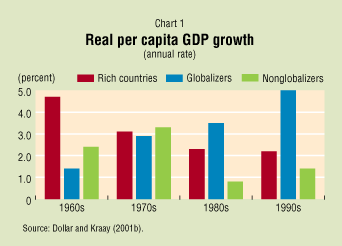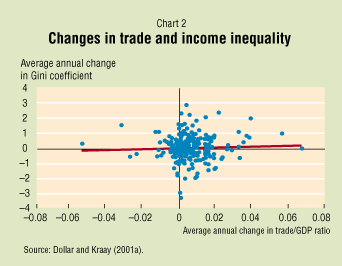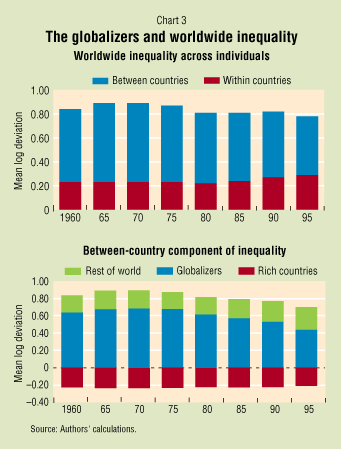Globalization and free trade have increased incomes in the developing countries.


Poverty has declined
Gap between rich and poor has narrowed
We have already seen that income inequality within countries is as likely to decrease as increase with increased trade. But is globalization leaving poor countries behind and widening the gap between the richest and poorest countries? Our evidence on the growth performance of the globalizers relative to the rich countries and the nonglobalizing developing countries suggests otherwise. The rapid growth of the globalizers relative to the rich countries means that the globalizers are narrowing the per capita income gap. Moreover, because most of the globalizers—especially China, India, and Bangladesh—were among the poorest countries in the world twenty years ago, their growth has been a force for narrowing worldwide inequality.

http://www.imf.org/external/pubs/ft/fandd/2001/09/dollar.htm
What the hell is this garbage?
Globalization does nothing to help anyone but the rich. There is no situation where everyone can get richer. One must lose so somone else can gain. If you use a small enough data sample you can skew the results of any graph. And when there are catagories that are vague and general like rich countries, globalizers and non-globalizers, somehting looks a little fishy. What about a specified growth rate for each and ever country? And GDP is also rather meaningless.
GDP = private consumption + government + investment + net exports.
Therefore, the private consumption of a nation may decrease while the exports generated by globalization are increased. Also, government spending includes military spending which often does not do anything to help the people within developing nations. Also, natural disasters increase the GDP but not the quality of life. Homes and schools have to be rebuild and that helps the sconomy, as does burrying the dead. That makes people richer but it is bad for the country as a whole. To read more about GDP, go to http://en.wikipedia.org/wiki/Gross_domestic_product. Thats where i went
This "garbage" is a long, detailed study looking at many countries across the world, and at the distribution effects of income both within and across those countries.
This is very incorrect. Globalization and the opening of markets has, with fits and starts, been occurring for the past couple hundred years. During that time, the economy has grown tremendously. And it is not a zero-sum game. This is obvious as individuals, orgnanizations, businesses and countries apply technology to areas of specialization, which is the foundation for economic growth.
Well, if you think there is a flaw in their methodologies, why don't you request the data, do an analytical critique, and report back to us. Here are the authors
Aart Kraay is a Senior Economist in the Development Research Group of the World Bank's Development Economics Vice Presidency.
Here's the World Bank's headquarters. I think they still work there
The World Bank
1818 H Street, NW
Washington, DC 20433 USA
tel: (202) 473-1000
Give them a call and request their data. I'm sure they'd more than happy to oblige.
To read more about GDP, one should take an economics class.
This is only true in zero sum economies. In a gold standard economy there is a finite supply of gold and when one person gets rich other people as a result must get poorer.
But the whole world is on a money supply economy where theoretical monetary units are pumped into the economy every day. Everyone really can become wealthier and, ironically, this model prevents the phenomenal concentrations of wealth that were seen in the 1800's.
Bill Gates is the worlds richest man but his personal income is a scant fraction of US GNP.
Andrew Carnegie was once the world's richest man and his income at its peak was over 5% of US GNP.
In 1890 something like 40% of US wealth was concentrated in less than 100 families. All as a function of zero sum economics.
Then comes along the Federal Reserve in 1913 which was partly as a result of monopoly busting in the 1890's and the gross disparities in wealth in the country began to dissipate.
And the standard of living for even the poorest American is better than it was 100 years ago.
With the current global economic model we can create something on the order of 1,000 millionaires each and every day and not have to take a penny from anyone else if those new rich people got their wealth solely from economic expansion.
The old paradigms of rich and poor no longer apply.
The board game Monopoly is an example of zero sum economics. There is a finite supply of money and once one person controls the wealth everyone else loses.
But imagine if in every turn-based cycle that an additional $500 was placed into play and people could pick up more money no matter how much was controlled by the leader.
Then there'd be a fair chance for the other players to become the leader themselves.
At the least they could stay in the game.
This is how the global economy functions now.
Bart, you're causing trouble again. Your non-socialist statements will no be popular. ![]()
Technological advancements can occur in a fixed money supply environment, and thus economic growth can, and has occurred in such a system. A monetary system does not necessarily represent the accumulated stock of utility in a static manner. Utility can change in any monetary system. However, the money supply can effect the stock of utility over time, which is why it is easier to grow if the money supply grows with the rate of the economy.
My anti-socialist statements are never popular. At least not with socialists.
Where I always get to them is when I point out that in a capitalist and market driven society that socialists and Communists are free to run off and form cooperative communes and socialize and communize to their hearts content. Hell, I defend their right to form communes if that's what they want to do.
But capitalists are never free to invest and produce in the centrally controlled economies of socialism and Communism.
They'd imprison, oppress, and kill anyone who didn't want to play ball with their Utopian visions of the world.
They'd never permit capitalism in their midst because they know that freedom and liberty are best expressed when a man can reap the fruits of his labors and not have some SOB from the government come take it away.
What it always comes down to is freedom.
No socialist is ever free. They can't be.
With all of our faults in the USA we can brag that people are free to form tax-exempt non-profit communes in Northern California, people are free to call themselves white separatists and hide in a bunker in Idaho, people are free to move to Berkeley, California and be openly Communist, and you can also become a billionaire if it is important enough to you.
No other country in the world can make the same simple claim I just did for the USA and what makes it possible?
Capitalism and a market economy backed by a national respect for the rights of individuals.
Socialism, on the other hand, is the death of liberty.
Jesus Christ Lord, I'm agreeing with this man. ![]()
Well, i was about to go into a big thing about the simil,arities, differences, and flaws of both capitalism and communism/socialism but i have decided not to. Wanna go at it in another thread Bart? I don't wanna hijack this one for it?
You never fail to amaze me. I mean this in a good way. Really.
Greed #1
Apathy
Complacency
Laziness
Envy
Desire
Selfishness
Entitlement
Maybe even patriotism……
Hmmm. I sure that many Scandinavians and French find their committment to egalitarianism to be quite patriotic. But I'm with you on the other things as simply being the shortcomings of humanity.
Yes, it is. But it is who we are.
Why bother?
Let me say that I think Communism is a hell of a way for a small community to get along. The Amish do it quite successfully and so do many small tribes all over the world. Where people all know each other and care about each other Communism works just fine. Once you implement it in larger groups it is doomed to fail because there will always be some schmook like Lenin or Stalin or Mao who will pervert it to his own selfish ends.
Ditto on socialism. It is a good idea but does not work because it both perverts human nature and stymies human innovation.
Capitalism is imperfect and results in unequal distributions of wealth, but then there's also an unequal distribution of talent, motivation, and fortune among people and capitalism rewards those who risk and succeed and who make good decisions.
"Equal distribution of wealth" is a nice notion but if you trade the word 'wealth' for 'talent' or 'beauty' you may start to see how this is a pipe dream.
Not all women look as good as, say, Cameron Diaz. It's just the way it is.
Not everyone is as good an actor as say, Sean Connery.
Yet both of these people benefit monetarily due to the unequal advantages they possess as individuals.
And who would begrudge them those benefits?
But you may have a hidden talent for, say, prognosticating the performance of mutual funds and you could end up wealthier than a whole host of people by exploiting your skills to their highest and best advantage.
Or you may prefer to watch TV instead of playing the market. In which case you will not get rich.
But that is a personal choice.
Truth be told, I hear the term "rich and lazy" from the envious all the time but I rarely ever meet a rich person who is lazy and I've never met a lazy person who was rich.
They may or may not be popular, but I still appreciate them nonetheless. I may disagree with Bart on 98% of all things discussed but I still value his opinions because I porbably would never have encountered them otherwise.
If I can echo Avro for a bit, I also believe that under capitalism there will always be poor people. It is capitalism's motivation mechanism and at the same time, it's curse.
Communism, like a lot of other things, is a good idea in principle. The goal of making sure all people aren't left behind by capitalism is a laudable one. It's just that the means of doing so are the antithesis of human nature.
Anyways, back to the topic...Globalization may have raised poverty levels slightly, but there are still people all over the world who are desperately ppor. What Globalization has accomplished is the concentration of wealth an number of western corporations at the expense of the working poor in the third world by taking the jobs usually done by skilled labourers in N. America and Europe and giving them to unskilled labourers at 1/10 of the pay.